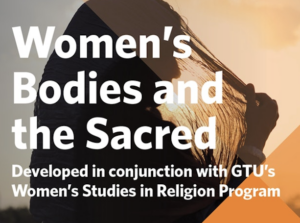Explore the intersection of faith, spiritual identity, and gender in this interview with Dr. Mahjabeen Dhala, Chair of the Women’s Studies in religion (WSR) program at the GTU as she reflects on her role and academic research for the GTUx Original Women’s Bodies and the Sacred.
With so much discourse around the identity of womanhood, both in the GTUx Original and in today’s discourse, how do you shape the identity of woman in your research? What does it mean to live in the fullness of the identity of, “woman?”
As a feminist theologian, I primarily focus on the spiritual identity of women rather than the gendered body or the cultural role. The identity of “woman” is complex and unique to each woman’s lived experience. In my research, I strive to challenge patriarchal norms, unearth inspirational narratives of early Muslim women in Islamic sacred literature, acknowledge intersectionality, embrace diverse experiences, and reclaim agency, facilitating the emergence of the most authentic and empowering “identities” of woman.
In the GTUx Original, the topic of “choice” and body identity arose in a fruitful discussion. How does the topic of “choice” and the quality/inequality of the body arise in academic and religious discourse for you?
As a religious leader, I have had the opportunity to engage Muslim communities worldwide. In my religious discourses, I stress the centrality of “choice” in defining human worth and spiritual status. By depriving an individual of their “choice,” institutions and cultures can either facilitate or impede the thriving of humanity. In the Islamic paradigm, the concept of human free will is deeply connected to personal growth, responsibility, and accountability and affirms that all individuals have agency over their actions and decisions, including those concerning their bodies. In an academic context, the question of “choice” undergirds discourses on autonomy and ability. It involves a critical engagement with how societal norms, power dynamics, and cultural expectations impact and influence individuals’ choices regarding bodies, whether it be in matters of personal expression, reproductive health, or bodily autonomy.
In the Original, the topic of women “speaking from [their] religion” arose in the context of the disparity in discourse—and the ability to even contribute to discourse—across race, socioeconomic status, and immigration status. How can individuals and communities empower women to “speak from their religion” to address disparities?
Communities must first create safe spaces where women can voice concerns and call out disparities, and then they must actively listen, value, and center the experiences and insights of women. Academic spaces can provide platforms that recognize and engage women’s voices from diverse intersectional, socioeconomic, and immigration positionalities through courses and grants, empowering emerging female scholars and critical thinkers to contribute to transformative dialogue and social change. At the GTU, the WSR seminar, mentoring sessions, student conferences, and public events are committed to doing just that!
The topic of childcare and childbearing arose quite frequently in the Original. The point was made that the investments in childcare today bring fruitful and positive changes for tomorrow. How do you see sacred texts and faith-based organizations as means of empowering both women today and tomorrow?
My research draws primarily on the Qur’an as well as extra-Qur’anic literature. I argue for reading sacred texts from women’s perspectives and constructive methodologies that resuscitate experiences and contributions of female theologians, exegetes, and activists eclipsed by unabated patriarchal, racial, sectarian, and secular biases. Such feminist scholarship would make sacred texts and religious traditions relevant and valuable to contemporary women’s concerns and empower them to curate a just future for all. Additionally, faith-based organizations can play a crucial role by advocating for women’s leadership, equal opportunities in decision-making processes, and grounding their teachings in religious activism, justice, compassion, and dignity of all individuals. They must create inclusive and safe spaces where female constituents can address violence against women and get access to unbiased religious and legal advice.
Was there anything you wanted to discuss, but didn’t have the chance? Is there anything that has come up since the discussion that you would like to address?
This GTUx Original provided me with the unique and exceptional opportunity to convene GTU’s outstanding scholars and thinkers in a face-to-face setting. I look forward to further engagements that encompass the diverse and rich tapestry of Abrahamic, Dharmic, and Indigenous perspectives, promising an intellectually stimulating and illuminating discourse.
Dr. Dhala is Director of the Madrasa-Midrasha Program and Assistant Professor of Islamic Studies at the GTU. She received her PhD from the GTU in 2021 and her MA in Islamic Studies from the GTU in 2017. Prior to her matriculation at the GTU, she pursued traditional Islamic seminary studies for over seven years and has led Muslim communities worldwide for nearly two decades.

